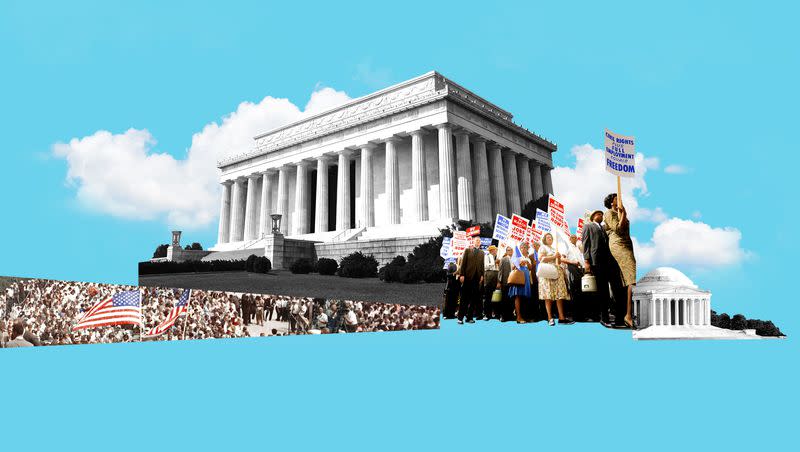Bill of Rights Day: What George Washington would say about today’s rising antisemitism

- Oops!Something went wrong.Please try again later.
- Oops!Something went wrong.Please try again later.
Today is Bill of Rights Day. We celebrate the rights and protections constitutionally adopted during George Washington’s first administration as president, on Dec. 15, 1791. Among these is the freedom of religion. It is not a stretch to believe that Washington would be dismayed by the recent rise in antisemitism in the United States. We know this because of his own words and actions.
As the new president of the United States, Washington visited Rhode Island in August 1790 to celebrate its adoption of the U.S. Constitution and to encourage the state’s ratification of the federal bill of rights, which the First Federal Congress had passed on Sept. 25, 1789.
While Washington was in Newport, Moses Seixas, the warden of the second-oldest synagogue in the United States, wrote a letter offering congratulations to the newly elected president. Washington used his response to explain the meaning of religious freedom in the new United States. “All Americans possess alike the liberty of conscience and immunities of citizenship” — all Americans, including the members of Seixas’ Jewish congregation.
Washington’s letter shows a transformation in the relationship between the government and Americans’ religious expression. When the Revolution began, George Mason, one of the most distinguished lawyers of that period, drafted a declaration of rights for the state of Virginia. Regarding religion, he proposed the text that “all men should enjoy the fullest toleration in the exercise of religion.” Mason was articulating the law as it stood in 1776. It drew from the English Act of Toleration of 1689, which allowed dissenters to worship outside of the state church. Essentially, after nearly a century of religious upheaval and state persecution of nonconformists, the English decided to give permission for worship outside the “true,” tax-supported state church. This tolerance increased political stability.
But the American Revolution went further, changing toleration — where the government gives permission to be religiously different — to a recognition that religious expression is an inherent right of conscience. Thus, James Madison proposed a change to Mason’s draft, that “all men should enjoy the free exercise of religion.” This is the wording the Virginia legislature adopted, and the phrasing that influenced the First Amendment’s free-exercise clause: “Congress shall make no law respecting an establishment of religion, or prohibiting the free exercise thereof …”
Related
Washington explained to Seixas this change from toleration to free exercise: “It is now no more that toleration is spoken of as if it were the indulgence of one class of people that another enjoyed the exercise of their inherent natural rights, for, happily, the Government of the United States, which gives to bigotry no sanction, to persecution no assistance, requires only that they who live under its protection should demean (humble) themselves as good citizens ...”
In other words, American religious freedom was constitutionally recognized as an inherent right, not a gift of the state. Everyone is born with it. The government may not persecute anyone whose religious expression differs from the mainstream. All the government requires is for everyone to be good citizens.
With an understanding of the constitutional right of free exercise of religion as an inherent right of all citizens, Washington gave well wishes for the Jews in Newport: “May the children of the stock of Abraham who dwell in this land continue to merit and enjoy the good will of the other inhabitants — while every one shall sit in safety under his own vine and fig tree and there shall be none to make him afraid.” These sentiments show Washington’s desire for unity among citizens and the preservation of the new constitutional republic. These were persistent themes of his presidential administration.
Alarmingly, contempt threatens that unity today. If George Washington could see our time, after his head quit spinning from indoor plumbing, electricity, cars and a recent U.S. president of color, he would be alarmed at the spirit of contempt rising among American citizens toward Jews and other citizens. Arthur Brooks in his book “Love Your Enemies” describes the dangers of contempt as a feeling of disgust, as if the targets of our contempt are worthless and below any regard.
One ordinary German soldier of the Reserve Police Battalion 101, when asked in a post-World War II interrogation how he could participate in shooting thousands of Jews, responded by saying, “We did not see Jews as human beings.” This soldier’s perspective was not unusual for the time. Widespread contempt for Jews in German society was the norm. This made Hitler’s rise to power and the Holocaust possible.
On Dec. 15, 1791, the states ratified Congress’ first amendments to the U.S. Constitution. Then, on the 150th anniversary, President Franklin D. Roosevelt issued a proclamation that named Dec. 15 as Bill of Rights Day, which we continue to mark today.
In the religion clauses of the Bill of Rights, the framers of the First Federal Congress laid a foundation for a pluralistic society. Religious diversity is a fact in America. Pluralism is how we constructively respond to that religious diversity through the lens of the First Amendment.
As ordinary Americans, let us guard our republic by rejecting the rise in contempt manifested by the increase in antisemitism and other forms of hate. Let us remember George Washington and help to build a culture of support, unity and celebration of the protections of religious freedom in America.
Eleesha Tucker is a Constitutional Literacy Fellow in the Center for Constitutional Studies at Utah Valley University. She teaches a required general-education course, American Heritage, which aims to inform undergraduate students of our foundational ideals and inspire them to fulfill their civic responsibilities. She is also the executive director of the Utah 3Rs Project, promoting rights, responsibility and respect through the lens of the religion clauses of the First Amendment.

